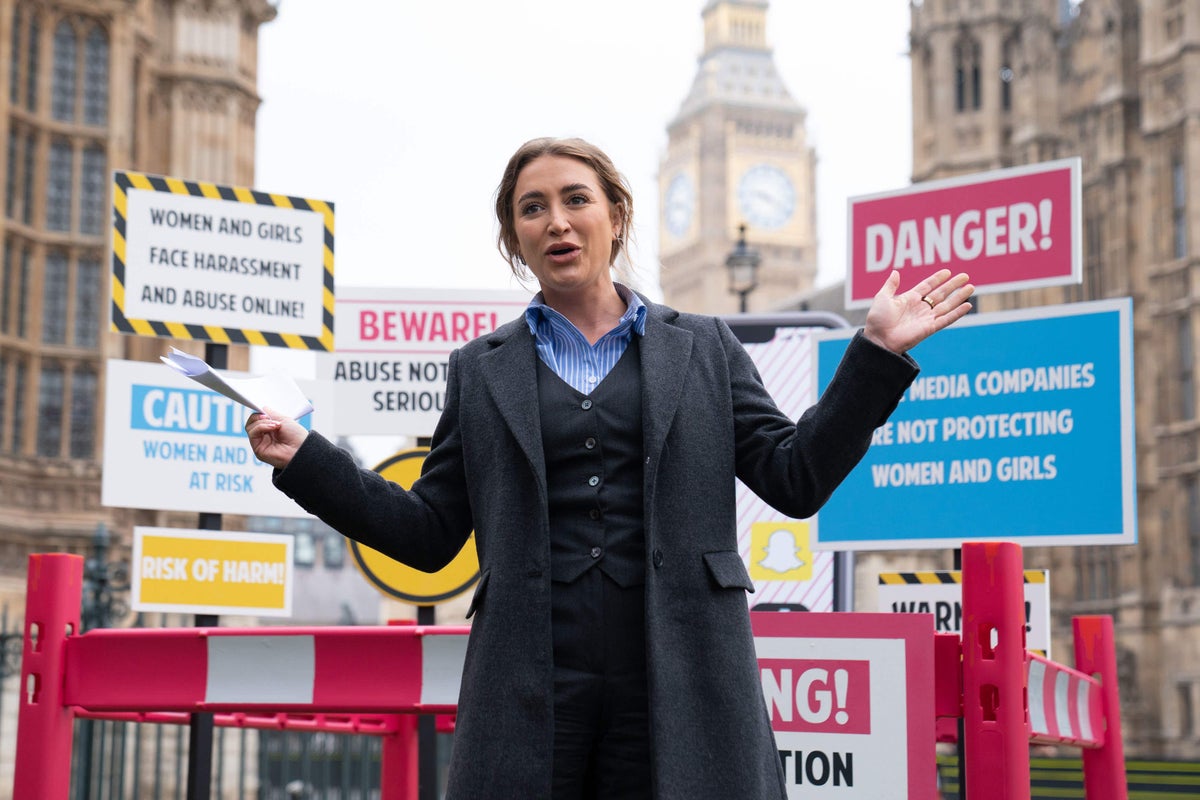
Love Island contestant, Georgia Harrison, who was a victim of revenge porn, attended a demonstration organised by Refuge outside the Houses of Parliament, calling for a violence against women and girls code of practice to be added to the Online Safety Bill.
The bill aims “to ensure social media companies respond to and prevent online violence” against women and girls.
It comes following Harrison, 28, experiencing “multiple men” approaching her saying they had seen a private sex video before she discovered it had gone viral on the internet, leaked by her ex-partner Stephen Bear.
Bear was jailed for 21 months for sharing the video on his OnlyFans page without Harrison’s consent.
Refuge, a leading domestic abuse support service, marked the start of the committee stage of the Online Safety Bill in the House of Lords with an installation highlighting the levels of online abuse aimed at women and girls.
The installation recreated a ‘danger zone’, featuring a giant mobile phone to highlight the multiple spaces online where women are at risk of abuse.
Refuge says more than one in three women in the UK have experienced online abuse or harassment.
Former Love Island contestant and ambassador for Refuge Sharon Gaffka, 27, also joined Harrison at the demonstration. She said she lives “in fear” of sexual harassment online being carried out in the real world.
What is revenge porn?
According to the Government, revenge porn is “the sharing of private, sexual materials, either photos or videos, of another person without their consent and with the purpose of causing embarrassment or distress”.
Revenge porn can have a damaging impact on your wellbeing, with a 2017 study published in Feminist Criminology listing PTSD, anxiety, depression, suicidal thoughts and trust concerns as some of the potential impacts.
What should you do if you are a victim?
“There are a number of different options available,” says Andrew Lord, senior associate solicitor for survivors of abuse at Leigh Day.
“Get professional legal advice first, you may be able to seek injunctions, and it is important to contact websites where things have been posted, once you have had legal advice.”
Should you contact the perpetrator?
Sometimes, says Lord, but “not always. Seek legal advice first about the best course of action, it is so case specific. A perpetrator may be incredibly hostile.
“One avenue you can go down is contacting the police if criminal legislation can be invoked. You will want to consider early on if speaking to the police is something you want to do.”
What can you do to protect yourself from any online abuse resulting from it?
If you are a victim of revenge porn, you may find yourself subjected to online abuse or harassment.
Online abuse can be reported to social media companies and even to the police, and Refuge campaigners are demanding greater safety measures for women online.
If you are a victim, it may be worth making your social media private for the time being.
What are your legal rights?
Revenge porn can come under multiple offences.
“It could be a misuse of private information, blackmail or harassment. You have the option to pursue a criminal complaint and a right to force takedown of information, but this is fact-sensitive, not every case will lead to all of these things,” says Lord.
Where should you go for help?
It may be a really distressing time, but “know that there are avenues for advice out there and seek out professional support right at the outset”, says Lord.
“You are not alone in this… There is an emerging area of support for image-based abuse.”
If you are worried about the cost, “There are free services out there for advice and resources available to people, like the Revenge Porn Helpline,” Lord advises.
Refuge’s National Domestic Abuse Helpline, 0808 2000 247, is available 24 hours a day, seven days a week for free, confidential specialist support.
Or visit nationaldahelpline.org.uk to fill in a webform and request a safe time to be contacted or to access live chat. For support with tech abuse visit refugetechsafety.org.







